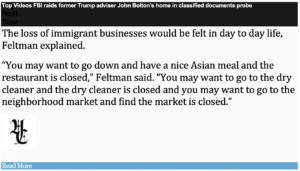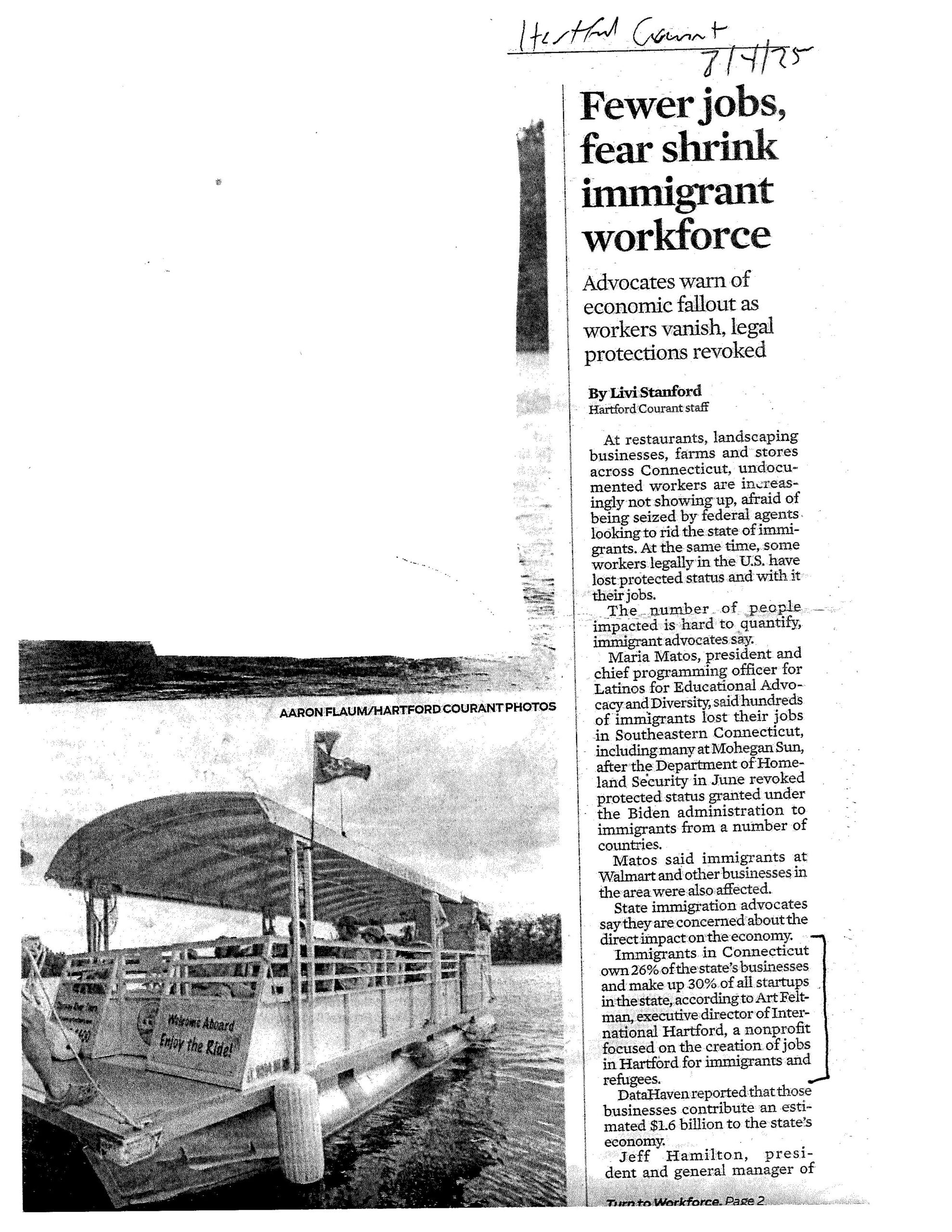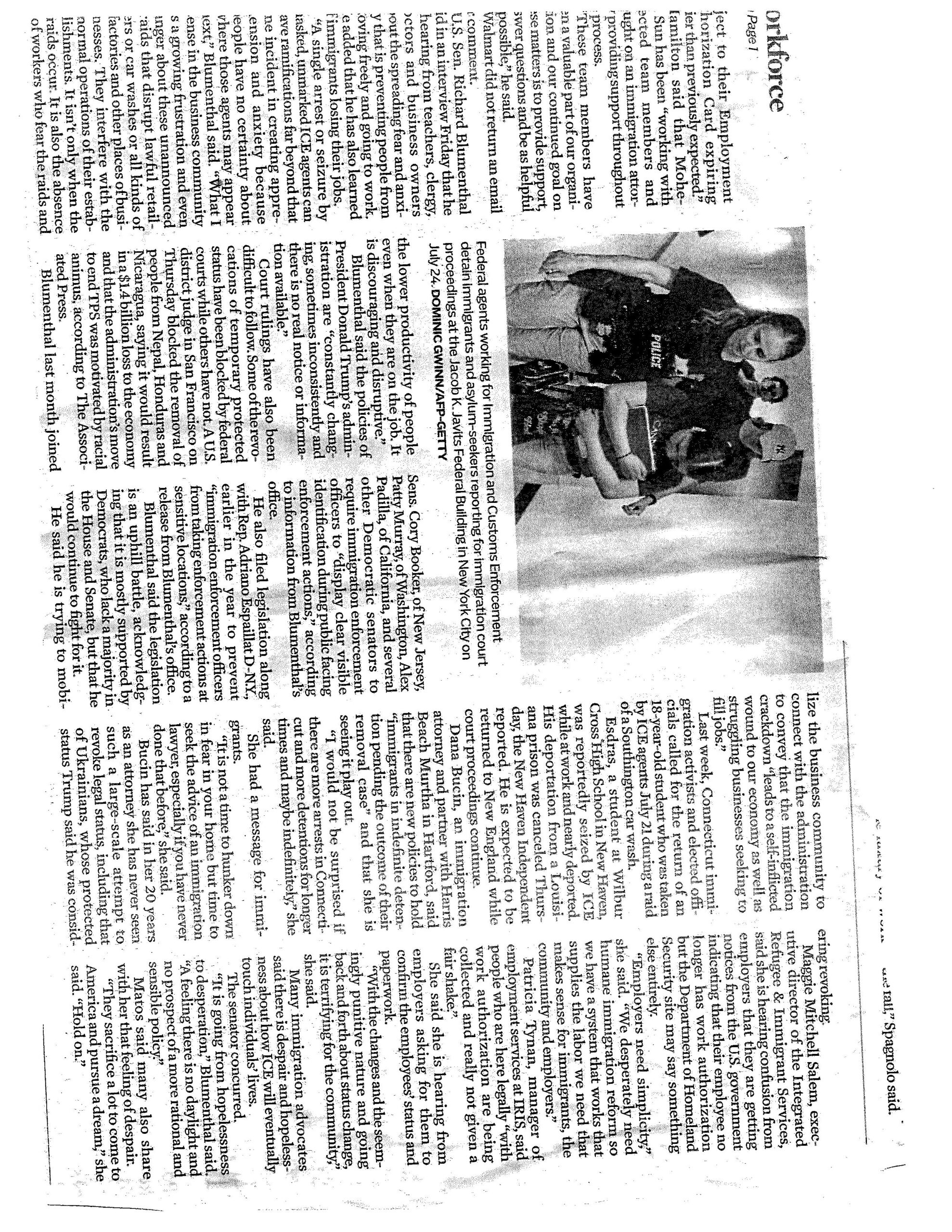Events
in the news ...
Trump deportation plan likely to be devastating to CT economy, experts say. Immigrants expand ‘the pie’
‘It is going to be their problem as consumers and taxpayers’

IImmigrant businesses are on every corner of parts of New Haven. Courant file photo
By LIVI STANFORD | lstanford@courant.com | Hartford Courant staff
UPDATED: July 14, 2025 at 1:23 PM EDT
State officials and immigration advocates are warning that President Donald Trump’s continued plan to deliver the “single largest mass deportation program in history” will severely impact Connecticut’s economy, resulting in the loss of thousands of jobs because immigrants are as a critical contributor.
Art Feltman, executive director of International Hartford, a nonprofit focused on the creation of jobs in Hartford for immigrants and refugees, said that if immigrants leave the state, the regional economy will “shrink.”
“So many people think that because they are native born that this is someone else’s problem,” he said. “It is going to be their problem as consumers and taxpayers. All these businesses are paying state and local taxes. Their taxes will go up. If you take the engine of the economy, the growing sector, the growing startups and you take them out of the economy, you are left with no growth.”
Feltman continued: “The potential effect on the economy is staggering. It can’t be measured. The Trump Administration is not just going after undocumented. It is going after anybody that is dark skinned. They don’t like them unless they are citizens.”
Immigrants in Connecticut own 26% of the state’s businesses and comprise 30% of all startups in the state, according to Feltman.
DataHaven reported that those businesses contribute an estimated $1.6 billion to the state’s economy.
Immigrant-led households in Connecticut paid an estimated $5.8 billion in federal taxes and $3.3 billion in state and local taxes, according to DataHaven.
“Undocumented immigrants in Connecticut are estimated to have paid $636 million in federal taxes and $371 million in state and local taxes,” DataHaven reported.
Immigrants own and work in businesses constitute a significant sector of the economy in areas such as health care, construction, restaurants and retail, immigrant advocates said.
Among immigrant entrepreneurs, of whom there are 47,400 in the state, approximately 22,184 or 46% have either revocable or no status and are therefore at risk of deportation, according to Feltman.
“Almost half of immigrants in the state are vulnerable,” he said.
Daniel O’Keefe, the state’s commissioner of the Department of Economic and Community Development, said immigrants are “a big part of our entire entrepreneurial ecosystem and a big part of our innovation ecosystem.”
O’Keefe added that “it saddens me to see how amplified this has become.”
“To now turn this into a thing where fear is spreading in societies — that is not who we are,” he said. “It is not who we aspire to be. I don’t believe that is what voters want and that is a mistake. Connecticut is a place where we want you to come and contribute and we want you to feel safe here.”
Overall, immigration experts and economists say that immigrants are not taking the jobs of Americans except in extremely limited circumstances.
Maria Matos, president and chief programming officer for Latinos for Educational Advocacy and Diversity, with offices in Bridgeport, Danbury, New Britain, New Haven, Norwich, East Hartford and Waterbury, said businesses large and small are feeling the impact of Trump’s deportation threats.
“Even well-known local Latino supermarket chains have shared how their operations are being affected,” she said. “Restaurants are seeing fewer workers and customers. Hospitals, too, are experiencing staffing challenges that impact their daily activities.”
Last month state immigration advocates warned that arrests of undocumented immigrants were ramping up in the state, creating anxiety and fear in communities with people taken every day.
Immigration attorneys said that ICE is targeting those who have been in the country less than two years, those with deportation orders and those enrolled in former President Joe Biden’s parole program. But some are just being profiled as ICE agents pass by.
On July 4, Trump signed his tax and spending cut bill, providing $350 billion for his border and national security agenda, including for the U.S.-Mexico border wall and for 100,000 migration detention facility beds. Money would go to hiring 10,000 new Immigration and Customs Enforcement officers, with $10,000 signing bonuses and a surge of Border Patrol officers, as well. The goal is to deport some 1 million people per year.
Supporting the state’s economy
The American Immigration Council reported that immigrants make up 19.5% of the state’s labor force and they account for “22.7% of STEM workers and 38.1% of health aides in the state.”
In a May report, DataHaven and The Connecticut Immigrant Support Network wrote that “policies that deter immigration, including those targeted at people who are legally authorized to work in the U.S. will harm the Connecticut economy.”
“In particular, deporting undocumented immigrants, who comprise 3% of Connecticut’s total population (about 117,000 people), would potentially wipe out tens of thousands of jobs, given that 87% of these immigrants are working age,” the report said. “Health and child care fields would be severely disrupted, as immigrants comprise 22% of all early childhood education workers in Connecticut and 38% of all health aides in the state.”
The report went on further to state that worker “shortages can lead to higher costs for goods and services, with one estimate finding that prices would rise by 9% nationally if several million people were removed from the labor force.”
New Haven Mayor Justin Elicker said that “literally in every community block of the city there is a business that is immigrant owned.”
“Our immigrant community makes our city and economy much stronger,” he said. “People bring different cultures to New Haven that we can benefit from. New Haven is the culture capital of Connecticut.”
Waterbury Mayor Paul Pernerewski Jr. described Waterbury as the “city of immigrants,” explaining that it has always been this way. He said while he could not quantify the percentages of businesses owned by immigrants, he noted it is significant.
“A lot of the small businesses and stores and some of the smaller restaurants are run by immigrants,” he said.
Dirty, dangerous and demeaning jobs
Sheila Hayre, clinical professor of law at Quinnipiac University and director of the Civil Justice Clinic, said under the Immigration Reform and Control Act of 1986 in part due to “pressure from business interests, Congress declined to make it a criminal offense for undocumented individuals to work without authorization, though it did make it unlawful for employers to hire workers who are not legally authorized to work.
“This reflects the general agreement that the U.S. economy depends on, benefits from, and grows because of immigrants,” she said. “Putting aside whether the mass deportation is achievable, mass deportation would be catastrophic to the American economy.”
She said most economists agree that immigrant workers’ jobs are not generally substitutable for U.S. workers and as a result do not take jobs that Americans currently fill except in very limited circumstances.
“Rather they help grow the economy by bringing different workplace skills and talents and creating new economic niches,” she said. “Instead of being a zero-sum game, overwhelmingly, they impact the economy by expanding the pie, creating new businesses and filling jobs in industries that simply are not attracting non-immigrant workers.”
She said immigrants are doing jobs characterized by the three ds- “dirty, dangerous and often demeaning” jobs that Americans are not doing.
“At construction sites, they are not operating the forklifts but rather are doing the back-breaking manual labor,” she said. “In restaurants, they’re often unseen in the back, sweating over hot stoves and dishwashers. In offices, they work at night, cleaning everything from windows and floors to toilets; from our backyard gardens to our large farms, they’re working in the scorching heat, often exposed to harmful chemicals and dangerous machinery.”
Maggie Mitchell Salem, executive director of Integrated Refugee & Immigrant Services, said America is on the edge of a demographic cliff.
“We have boomers retiring in record numbers,” she said. “We have a declining birthrate.”
She said Gov. Ned Lamont has cited that immigrants are why the state has grown economically in the past few years.
“And all of that is going to come to a stop because of the national immigration policies,” she said. “There are no refugees coming in and there are enforcement actions including travel bans as a general atmosphere not favorable to immigrants.”


ICE raids may leave a hole in economy

Immigrants urged to protect assets amid Trump crackdown
BY DON STACOM HARTFORD COURANT. With U.S. Immigration and Customs Enforcement agents seizing people in Connecticut and ordering rapid deportations, the nonprofit International Hartford is advising foreign-born homeowners and merchants to act in advance to protect their assets. “In Metro Hartford, nearly 1,600 are at risk of immediate deportation, including at least 250 in the city of Hartford,” Art Feltman, executive director of International Hartford, told the city council last week. “These individuals may have to abandon 1,000 owner-occupied homes in the city. This will lead to widespread job losses, shrink the tax base, and most importantly, leave commercial corridors and residential neighborhoods pockmarked with vacancies,” Feltman said. He is one of several Connecticut people connected to the immigration field who We are recommending that people at risk of deportation take steps beforehand to preserve their property. “I’ve never done so many powers of attorney as I’m doing now,” said New Britain attorney Adrian Baron, who has been a prominent civic leader in that city’s Little Poland section. “People are getting their will up to date. There’s a lot of fear in the immigrant community right now. There are a lot of green card holders who are afraid to travel to Canada.” Glenn Formica, an immigration attorney in New Haven with more than 25 years experience, said he applauds Feltman’s idea for an outreach effort to reach non-citizens. “It’s brilliant. Most of my clients are small entrepreneurs, people with small cleaning businesses or small construction businesses. I’ve had conversations with clients ‘don’t do this’ because it can lead to abuse if they’re under threat and take in a citizen partner (without planning and advance work) or hand the business over to another immigrant,” Formica said. Attorneys and immigration activists for years have counseled immigrants who own property, particularly real estate or a business, to have an asset protection plan plan in place that could include a written financial plan, revocable trusts, a power of attorney, notarized business agreements, and a schedule of lease, insurance, tax, mortgage, or other payments that need to be made. But the crackdown on immigrants has pushed the issue to the forefront in immigrant communities across the country. “The Trump administration’s directives to immigration enforcement agents have effectively made any person unlawfully present in the United States a potential target for deportation,” according to the Contingency Planning for Immigrant Business Owners in California, published by the Lawyers’ Committee for Civil Rights of the San Francisco Bay Area. “As immigration enforcement activities increase in California, it is increasingly important for immigrants to plan for detention or deportation,” it warns. Feltman offers a similar caution in Connecticut, where more than 15% of the Popular is a foreign-born. “Many immigrants hold green cards; they are revocable at the whim of an administration,” he told the council. His organization provides business counseling and financial literacy training to immigrant-owned businesses, and gives microgrants of under $10,000 each to minority owned businesses. If those businesses are abruptly left without an owner, there’s a lot at stake, he said. “The city or town loses property taxes, the employees lose their jobs,” he said. “And as a business support agency, we are concerned about the effect on the local economies. These businesses are paying taxes, they’re occupying space, whether it’s a factory or storefront or restaurant, or office. If the owner gets deported, it gets abandoned.” “There are over 37,000 immigrant entrepreneurs in the state, and in most metro areas, any retail growth is from immigrant-owned businesses,” Feltman said. Many immigrants in Connecticut are here as asylum seekers from Ukraine, Afghanistan or countries with famine, and they can be subject to deportation, advocates warn. “We’re seeing ICE surveillance and investigation. We’ve had ICE confronting people at the Mercado (on Hartford’s Park Street). People are scared. There’s a family here that built up a business, it has three restaurants, and the owners are worried,” Feltman said. Feltman’s organization is trying to get funding to educate immigrant business owners owners in Greater Hartford about the specifics of preparing business affairs in advance of possible deportation. “By the time there’s an ICE arrest, it’s too late,” he said.



